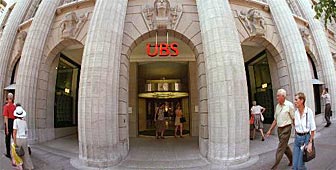Swiss banks lead charge against dirty money

Twelve of the world's biggest banks have decided to further crack down on money laundering. The move comes as the banks are feeling the heat of criticism, being regularly dressed down for failing to stop the flow of dirty money into their coffers.
A package of measures to combat money laundering will be announced at the beginning of next week. Switzerland’s largest bank, UBS, confirmed on Monday the 12 banks had agreed to further the fight against dubious funds.
The measures are known as the “Wolfsberg guidelines”, after the UBS training centre in Switzerland where they were agreed upon. The accord was drawn up in conjunction with the anti-corruption pressure group, Transparency International.
The bank added that the guidelines aim to ensure “a global standard of due diligence” for banks which deal with rich clients.
The agreement was spearheaded by Swiss banks, which control about one third of the world’s private banking market. They are anxious to protect their reputation from allegations that they provide a ready haven for dirty money.
Last August six Swiss banks, including Credit Suisse, were reprimanded by the Swiss Banking Commission for serious shortcomings in procedures relating to the handling of funds from dubious sources.
Switzerland’s efforts to combat money laundering were last week praised by Britain’s Financial Times newspaper, which said the country had led the way in recovering funds salted away by Nigeria’s former Abacha regime.
Switzerland has frozen suspect bank accounts containing $645 million (SFr1.148 billion), which was thought to have been deposited in the country by Abacha and his cronies.
The FT report, published on Friday, said Switzerland “was the first to respond” to a probe commissioned by the Nigerian government to track down funds stolen by Abacha.
By contrast, said the paper, the British government “has failed to respond more than four months after the request was made”.
Correspondents say the FT report demonstrates that Switzerland is not alone in having unwittingly provided a haven for Abacha’s stolen money, but is one of the few global financial centres to be doing something about it.
The FT estimates that $590 billion (SFr1,050 billion) is laundered annually. The banks involved in the agreement include: Swiss banks, UBS and Credit Suisse; Britain’s Citigroup Barclays and HSBC; Germany’s Deutsche Bank; France’s Societe Generale; Spain’s Banco Santander; and ABN Amro of the Netherlands.
swissinfo

In compliance with the JTI standards
More: SWI swissinfo.ch certified by the Journalism Trust Initiative









You can find an overview of ongoing debates with our journalists here . Please join us!
If you want to start a conversation about a topic raised in this article or want to report factual errors, email us at english@swissinfo.ch.